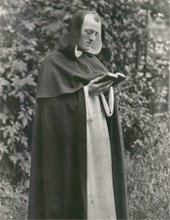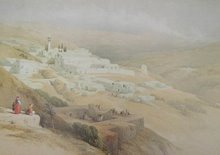So who was Father McNabb?
He was born Joseph McNabb, at Portaferry near Belfast on 8th July 1868. He was thus - I think importantly - senior to both Belloc and Chesterton, by two and six years respectively. His father was a sea captain whom he seldom saw: his mother was just that, a mother, and - in his eyes - all the more blessed for being “just” that (before her marriage, at a very young age, she had occupied an important sales and administration position in a New York department store). Not that she didn’t have other things than bringing up the children and managing the home to occupy herself with: one of Father McNabb’s first memories is of his mother taking him on a sick visit to a lady with a cancerous growth in her chest whom Mrs McNabb would wash and comfort. Mrs McNabb appears always to have played a leading part in parochial charity, and frequently to have commanded her children’s assistance. She was the mother of eleven children in total, Joseph McNabb being the tenth. In his later years he wrote a book, almost an autobiographical study of his early years, called Eleven, thank God! which he dedicated to his mother and which stands as a great apologia pro familia magna. Family always held a central place in Father McNabb’s world, as it indeed holds a central place in Rerum Novarum.
Although born in Ireland, by the age of 14 he had moved with his family to Newcastle-upon-Tyne, on account of his father’s work. A move to London had been considered but the capital was thought to be too terrible a place for the bringing-up of children. For a short while Joseph McNabb continued to board for most of the year at St Malachy’s in Belfast until he was 16. However, the influence of his time in Newcastle was important to him, for his family moved into the parish of St Dominic’s which was - unsurprisingly - run by the Dominican Order. He was profoundly impressed by all he saw of Dominican life and spirituality, of their asceticism, their love for Holy Scripture and their profound learning; and so, after leaving St Malachy’s and taking one unsatisfactory year at St Cuthbert’s Grammar School in Newcastle, he decided to become a Dominican. Curiously, what appears to have been the principal human motive behind Father McNabb’s vocation was the same thing that drove Chesterton into the Catholic Church - fear of Hell. As he put it: “I don’t want to go to Hell; I think I’ll go to the Novitiate!” Undoubtedly, while many reasons can be identified for the motivation behind his vocation, the simple fact was that he felt God was calling him to become a friar in order to save his soul.
At the age of 17 - despite his father’s initial anger at his son deciding to pursue a vow of poverty: “I’ll never, no I’ll never consent to a child of mine becoming a voluntary pauper!”: an anger which only abated after a visit from a Dominican from the local Priory to explain the nature of poverty - Joseph McNabb entered the Dominican novitiate at Woodchester. The Dominicans at this time were but a small band: following their establishment at Woodchester in 1854, at the point of their lowest ebb in England, they were by 1885 only just beginning to attract novices and still barely had enough of them to justify a novitiate. Joseph McNabb’s entrance to the Order coincided with the beginnings of a comparative deluge of able and devout novices who entered in his year and the three or four years following, novices who once professed formed the basis of the Order’s rise to prominence during the first half of the twentieth century, principally under the aegis of Father Bede Jarrett.
As we have seen, Father NcNabb was ordained in September 1891, shortly after his 23rd birthday, and in the year of Rerum Novarum. He was the most brilliant scholar of his year in the novitiate, although the following years were to see some greater academic minds entering the Order. One of Father McNabb’s contemporaries wrote that “only Father Humbert Everest - who had left the novitiate for Louvain two years earlier - could have challenged [Father] McNabb’s intellectual supremacy”. Indeed, Father McNabb followed Father Everest to Louvain for further studies. By 1894, three years after his ordination, Father McNabb was sent back to Woodchester with his Doctorate in Sacred Theology.
For the next 26 years, Father McNabb was sent hither and thither as holy Obedience demanded. He taught novices at Woodchester for 3 years upon his return from Louvain and was then sent to Hawkesyard (where the senior novices were now taught) again for 3 years, to teach theology. For the following 6 years, 1900 to 1906, he was returned to Woodchester as Prior (at the tender age of 32): in 1906 he first went to St Dominic’s Priory in north-west London for the first time as parish-priest for two years from whence he was plucked back in 1908 to become Prior of Holy Cross, Leicester, for 6 years until 1914. In 1914 he was elected Prior of Hawkesyard, where he faced his severest personal and spiritual tests (and made some enemies - a point we will have to come to later), a position he served in for 3 years: for a further 3 years he served there as Professor of Dogma before returning to St Dominic’s Priory in London, where he served again as parish-priest until his death on 17th June 1943, some 23 years later.
Wednesday, 18 April 2007
Subscribe to:
Post Comments (Atom)


No comments:
Post a Comment